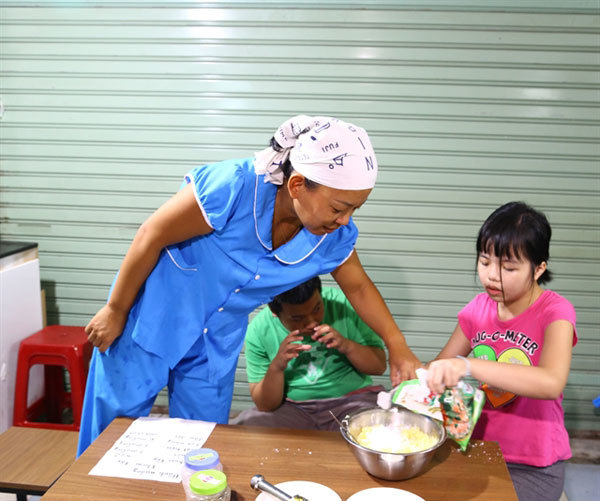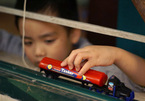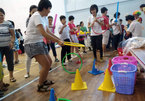 |
|
Ito Mai teaches children at the Ước Mơ Xanh (Blue Dream) Centre for Inclusive Education in Da Nang City how to make a cake.
|
The coffee is made by Mai and Duy Thai, an autistic teenager. In the kitchen of the Ước Mơ Xanh (Blue Dream) Centre for inclusive education, every day, Mai teaches Thai to make coffee with great perseverance and tenderness.
The kitchen corner then turns into a cafe of sorts as Mai enjoys his coffee and pays Thai a small sum of money, teaching him how to do simple things and recognise money.
“I hope such small steps and basic skills will help him find inclusion in life in future,” she said.
Mai came to Vietnam in October 2018 under a two-year volunteer programme carried out by the Japan International Co-operation Agency (JICA) since 1995.
She chose Vietnam as many of her friends had visited the country and she was told that Vietnamese people are kind and friendly.
She also said that she heard about supporting centres for Agent Orange/Dioxin victims and she was interested in the history of the country.
“I want to learn about Vietnamese culture, history, society, social welfare efforts for people with disabilities in Vietnam and then use the knowledge in my volunteer activities,” she said.
“In addition, I would like to introduce Japanese culture and social welfare for people with disabilities in Japan to Vietnam.”
 |
| Ito Mai gives food to a boy during lunch at the centre. Teaching living skills to the children always requires patience and love. |
With 17 years of experience in caring for people with physical and intellectual disabilities, Mai was selected to come to Ước Mơ Xanh Centre under the Da Nang Association for the Support of People with Disabilities and Orphans. The centre was established in 2014 and is the second home of some 50 children with autism, language disorders, communication disabilities and hearing impairments.
She said that her first six months at the centre were a struggle and she lost motivation as learning the Vietnamese language was too difficult, making communication nigh on impossible.
“I was surprised that even though my colleagues encouraged and comforted me a lot, I was always in a depressed mood,” she said.
Then Mai realised there she wasn't the only one with problems and saw her Vietnamese colleagues also struggling to overcome the language and cultural differences between them.
“This helped me change my emotions and focus on my volunteer activities,” she said.
Now, Mai, along with Vietnamese teachers, has taken care of and taught children aged from 8 to 16 with intellectual or development disabilities for one and a half years. The children are now familiar with friendly and smiley ‘Antie Mai’.
“Every day, I teach the children how to make cakes, how to eat, how to exercise, how to clean themselves,” she said, “I also teach them maths and writing, shopping at markets and help them with social skills.”
“Every day here is an unforgettable memory to me,” she said, adding that she had been welcomed like a family member.
She recalled a story of a little boy beating the teachers when she first arrived and he was punished by being isolated until he apologised.
Thinking the boy would not understand why he was punished, she spoke to him privately and patiently explained what he had done wrong.
“He finally understood and apologised to the teachers and went out to eat with his friends,” Mai said, adding that the boy since then had been very close to her and became ready to receive her help.
A Vietnamese teacher at the centre said that Mai always treated the children with love and care.
“When she teaches the children, she is very patient, gentle and always tries her best to speak in Vietnamese to the children,” she said, adding that she had learnt a lot from the Japanese teacher.
For example, she said, when Mai taught the children to make Japanese-style potato cakes, she guided them very patiently from the very beginning how to peel and clean the potatoes, how to steam and grind, even how to organise seasonings.
“Those are simple things to most kids, but to those special kids, they need special ways,” she said.
Twice a week, Mai teaches the children to make different cakes, which she uses as a way to teach life skills and offer therapy to the children.
She has also proposed teaching the children to use public transport.
Director and founder of the centre Le Thi Kim Thu said Ito Mai’s methods were highly appreciated.
Thu said that at the centre, the formation of independent living skills for children with developmental disorders was a focus from an early age.
The educational content also takes many forms as an independent living skills education through daily activities such as personal hygiene, dressing, doing housework, eating and drinking at home and in class, communicating with other people and vocational training.
“Ito Mai works very hard and enthusiastically with a sense of responsibility and caring,” Thu said, adding that her care has helped many children improve.
Mai said that there were differences in how people with disabilities are supported between Japan and Vietnam.
“But the teachers here told me that being close to the child will pay off and I am glad my method did work,” she said.
“There are indeed no cultural differences or language barriers between me and the children as they do not care about the differences, they are willing to accept me after all,” she added. VNS
Hong Minh

Child with autism in Vietnam overcomes societal barriers in integration
With the growth of Vietnam’s young population, recognition of children with autism has increased over the years. The upbringing and education of children with autism is a societal responsibility.

Teachers of autistic children appreciated at HCM City event
Saigon Children’s Charity and Vietnam Autism Network organised the Teachers of Children with Autism Appreciation Day in HCM City on Saturday where children on the autism spectrum were taught to make appreciation cards for their teachers.
 Ito Mai, a 40-year-old Japanese teacher for children with autism in the central city of Da Nang, starts each day with a special cup of coffee.
Ito Mai, a 40-year-old Japanese teacher for children with autism in the central city of Da Nang, starts each day with a special cup of coffee.